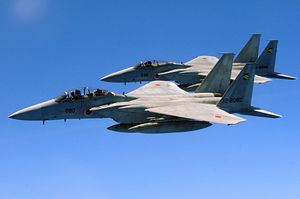A few defense and security-related links to start your week off right:
Last week, Japan’s defense ministry confirmed that Japan is scrambling its fighters at levels unseen since the Cold War. In fiscal year 2014, Japanese jets scrambled 943 times, representing a 16 percent increase over 2013. This means, on average, Japan scrambled its jets around 2.5 times a day. The increase is primarily due to Russian and Chinese aircraft approaching Japanese airspace regularly. China claims sovereignty over the Senkaku/Diaoyu Islands in the East China Sea and has sent its aircraft and ships to the area in the past. Japan regularly scrambles jets to respond and maintain its administrative claim to the islands. Russia, meanwhile, has sparked Japanese sorties by conducting strategic bombing exercises in the western Pacific Ocean. The Japanese defense ministry clarified that no aircraft violated Japan’s airspace.
Philippine President Benigno Aquino on Friday emphasized that the South China Sea maritime territorial disputes are not an isolated regional issue, but a global problem demanding the attention of the international community. “We keep asserting the problem in the South China Sea is not a regional problem,” Aquino said. “This is a problem of the whole world because 40 percent of global trade pass[es] through these waters. Global leaders have already expressed their concern on this problem.”
Meanwhile, Japan and the United States are considering conducting joint surveillance operations in the South China Sea, Japan Times reports. Such a move would undoubtedly provoke China’s anger and is unlikely to be implemented any time soon.
In case you missed it, the New York Times reported on China’s construction of an aircraft runway in the Spratly Islands. The report follows on the heels of an April 8 report which, with satellite imagery provided by CSIS’s Asia Maritime Transparency Initiative, showed China’s land reclamation efforts in action in the Spratly’s Mischief Reef.
Writing for War on the Rocks, Enrique Oti argues that the reason China employs offensive cyber espionage is because its government is fundamentally “scared of the Internet.” Oti writes:
They are scared of the foreign ideas that it brings into China; they are scared of how it enables the Chinese people to spread knowledge about government corruption; and they are especially scared of how it was used during the “color revolutions” and the “Arab Spring.” For the Chinese Communist Party (CCP), the Internet is a clear threat to its legitimacy, its monopoly on power, and its survival.
Want to know what Asia’s top diplomats are thinking? Keep an eye on our Diplomatic Access series of interviews. The latest entry into the series is Kenichiro Sasae, Japan’s envoy in Washington. Previously, we’ve featured ambassadors from the Philippines, Timor-Leste, South Korea, Pakistan, and Mongolia.

































